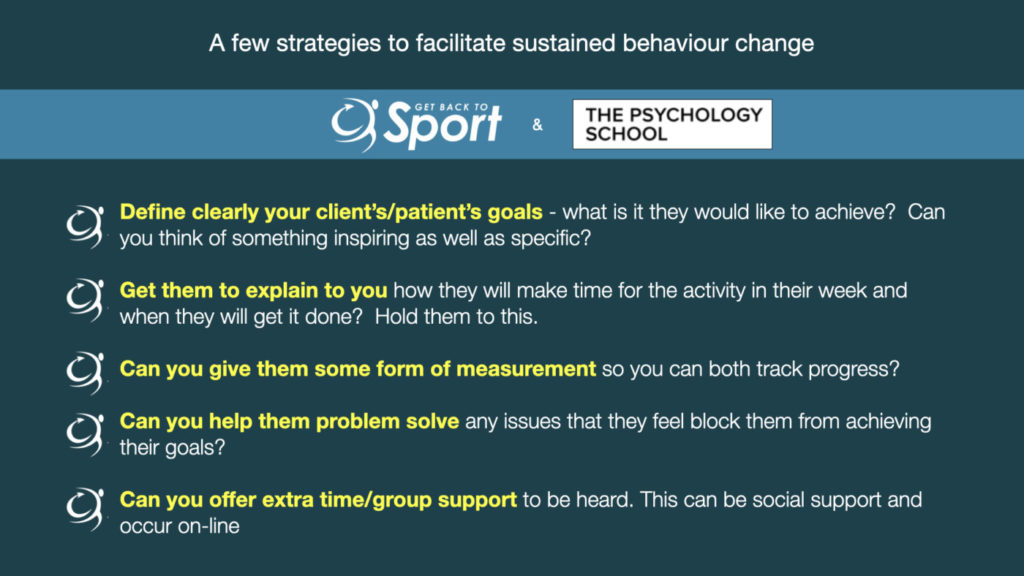Welcome to post 52 of Strength & Conditioning For Therapists and the 2nd is a series of 3 exploring the effects of COVID-19 and lockdown. Today, I’m delighted to welcome Serena Simmons, Chartered Psychologist to the blog (her 2nd appearance). She’s taking up the reins to explore: how has lockdown influenced psychological health? – and some simple strategies you can use in your practice. Over to you Serena!
Stress & Lockdown
Have you at any time felt stressed, anxious, stuck, bored, guilty, scared, down, calm, content, happy, grateful? It wouldn’t be unusual to have experienced any of these feelings or even a rollercoaster of these emotions as you’ve found yourself in these unchartered waters.
As you’re well aware, we each respond differently to any given situation and this strange time has proven no different.
Due to this global pandemic we’ve been faced with a multitude of different things from significant changes in work/business and family life, to home-schooling, illness and bereavement as well as the loss of our freedom to travel and see loved ones.
There’s also the fact that we are in many ways, still dealing with the unknown and therefore planning for our future can seem unsettling and uncertain. No wonder then that we see many people struggling to cope.
Psychological Responses Are Individual
No one is the same, and as such we all come with our own history, situations and things we’re dealing with as well as the stories we hold about ourselves in all manner of areas in our life. Therefore, undoubtedly we relate and respond in our own unique way to what is set before us.
Ultimately then, there is no ‘correct’ way to respond to this Pandemic and I’m sure like me, you’ve experienced the changes in emotion yourself, as well as witnessed the same in those around you, including your clients and patients.
I certainly have; my my clients have presented to me with more issues around stress, feeling anxious, dealing with having to change business structure, changes at work including redundancy and many of them struggling in their relationships. Was he always this annoying?..I’ve heard more than once!
But could there be a long term impact to us and our mental health because of this?
The Potential Impact Of COVID-19
The effects of isolation and lack of activity are well reported in terms of physical health and have been shown to include a myriad of related issues including heart disease, stroke and other important factors, many of these being covered by Claire in her blog last week.
Often, however, the psychological impact is not as well reported in situations like this, and certainly with this unique situation we see before us, it’s important that we understand the impact this may be having, as undoubtedly the knock on effects of something this significant will be far reaching.
Previous research into similar situations where outbreaks of disease have occurred have shown, for example, that factors such as boredom, inadequate supplies and information, financial loss and stigma can have negative psychological effects lasting up to 3 years (Brooks et al. 2020).
Arguably then, the more we know and understand about the potential psychological impact, the better equipped we are to help people – our patients and clients – going forward.
COVID-19: The UK Landscape
people are thinking differently, feeling differently and behaving differently
Interestingly The Nuffield Foundation funded a project at University College London (ref below) back in March 2020 at the start of Lockdown in the UK. It aims to address the psychological and social impacts of COVID-19 in over 70,000 adults across the UK, collecting data on a weekly basis.
As it stands their research currently indicates that despite the easing of the UK lockdown measures, 28% of adults report that their life is completely different or has ‘lots of differences’ compared to their lives pre-COVID.
Further to this, data indicates that people with lower incomes or pre-existing mental health issues are spending more time in their homes than those on higher incomes. Also, they state that those from BAME (Black, Asian, and minority ethnic) backgrounds are also reporting higher levels of depression and anxiety.
In summary, and although it’s early days in terms of actual data capture, we can see clearly that people are thinking differently, feeling differently and behaving differently and that the trajectory of this is something that needs addressing now. And as practitioners in various aspects of health, physical or otherwise, we also have an opportunity to help.
COVID & Exercise
It comes as no surprise that this situation is having and will continue to have an impact on many areas of our lives. This focus of this piece however is to specifically address how this has impacted people’s ability to engage in exercise and movement? And more importantly what can we do to help people who may be struggling to engage in this capacity?
The first thing to acknowledge is that not everyone will struggle.
Early lockdown measures saw those who were habitual exercisers or athletes climbing the walls, sometimes literally, in order to get their daily fix. Fashioning weighted devices to lift or offering to take the family dog out for another walk/run was the norm. Their biggest issue was being made to stop exercising in the first place. Since we’ve been allowed to exercise and return to gyms, this group is once again able to embrace movement.

Another group we saw emerge early on were the people who felt they never had time to exercise before. Suddenly abundant with time and with nothing to do but bake sourdough bread, they were suddenly inspired to build home gyms and Instagram their ‘fitness journey’.
Where are these people now? I expect some have experienced the true benefits of exercise for both physical and mental health and have continued in some form, to incorporate movement into their week. You may have encountered this group in your clinic, with them having suffered acute MSK injuries as a result of novel fitness pursuits. I’m under no illusion however that for reasons we don’t have the capacity to enter into here, they may also have ‘fallen off the wagon’ and that their ‘normal’ baseline of activity has now resumed.
This being said, there is a group in the middle who may have been struggling that have been missed. And in many ways they are the ones who still are struggling.
Effects Of Lockdown; The Missed Middle
Liken it to a middle child, or those kids in school who weren’t the smartest or the naughtiest, and there you have that ‘middle group’.
Usually these are the quiet ones, the ones who silently get on with it or who struggle without getting the help and attention they need or deserve.
In the case of exercise and rehabilitation, in this middle group you have those who have been too afraid to go back and exercise. You also have people waiting for surgeries that have yet to happen and so who are declining in function. There are those that are still shielding due to other illnesses. You have those who struggle to see the point and therefore lack the motivation, especially when they can’t do what they did before or don’t have access to what they feel they need, e.g. going to the gym.
It’s often people in this broad group that I’ve named the ‘middle’, that we see a decline, BUT where we can also have a big impact.
Psychological Strategies To Help Behaviour Change
Everything starts with how we think
If we’re able to impact someone’s thinking, we have a good chance of impacting their behaviour.
This is where knowledge of psychology becomes of paramount importance. You see before a person jumps into action they go through a series of thought processes and decision making behaviours that influence whether they will or won’t carry out what you have asked them to.
This cost-benefit analysis means essentially that your client has to see something in it for them, for them to want to engage. Now, you might be thinking that them engaging in the exercises you’re offering is going to help them, so why wouldn’t they engage?

The problem may be if they see more potential blocks or costs to them engaging than if they didn’t.
For example, a client of mine, Dan (not his real name) wanted to lose weight. He was very obese and he knew that his weight was holding him back from all manner of things from playing properly with his children to stopping him being in front of a camera for his business.
When we looked at what was stopping him, he was able to give me a long convoluted story as to why he couldn’t exercise including he didn’t have time, his wife wanted him do various jobs when he was home, he had previously been injured, he was too far from a gym, his bike was broken. I think you get the gist.
What I was able to do with him, was to get him to problem solve each aspect of his story. Questions like:
- ‘how do you think you could get home sooner?’
- ‘what other form of exercise may be on offer to you beside the gym or your bike?’
By using a strategy like this he was forced to come up with solutions to his current situation.
This is addressing basic Cognitive Behavioural Therapy techniques (CBT). Doing this doesn’t require you to have therapeutic training as it requires you to merely help your client problem-solve the things they perceive as blocks to achieving their goal. Even during these COVID times.
This leads us to goals.
Goal Setting
Yes, I’m sure you’ve heard about this time and time again, but goals, or a clearly defined goal, is what’s often needed to help your client/patient stay on track.
There is no reason why they cannot create a realistic and achievable goal/s and to share this with you so that you can both track their progress, again even during this pandemic.
If you can get this clear at the start of your work, you can help your client/patient stay on track by asking carefully crafted questions in relation to their goal as well as checking in with them during sessions about where they think they are in relation to achieving it.
The important aspect here is to keep the goal achievable and something they find compelling or inspiring.
Other Psychological Strategies
I’m aware that physiotherapists and other health professionals are an already over burdened group.
Many of you will be working long hours, going above and beyond for your clients/patients and that is nothing to be said of the struggles you’re having in your own businesses at the moment as you try and navigate changes about how you work, for example going on-line.
That being said, trying to factor in an extra few minutes into a session, which will allow you to cover some of these aspects, like addressing goals and problem solving will often make your work over the long-term, easier and more successful in terms of outcome.
Another suggestion would be to factor in group elements where possible (a good on-line strategy during the current time), especially for those who are struggling to adhere and who feel socially isolated.
Can you for example (and where appropriate) forge small groups of similar clients for on-line check-ins, which involve sharing progress and experiences? This Social Facilitation Effect can be a powerful one for those who are struggling to engage as it can work to highlight the benefits of exercise as well as helping people to stay on track. These sessions could also save time for you, helping to solve common issues.
Conclusion
COVID-19 has presented us all with a novel set of circumstances to navigate. Taking care of people’s mental health is vital to future wellbeing and in helping people to avoid physical decline by staying active and injury free.
Understanding psychological behaviours can help by allowing health professionals to implement simple strategies that can aide a person’s engagement and adherence to exercise. It can also help strengthen clinical practice as businesses search for novel and evidence-based approaches to encourage their clients buy-in to the process.
Lockdown: What can you do in clinic?

Intrigued to know more, learn about nudge theory, habit formation? Check out Serena’s amazing course:
Serena is a Chartered Psychologist and works as Senior Lecturer at Nottingham Trent University and in private practice through her company The Psychology School. She can be reached by e-mail at Serena@thepsychologyschool.co
.



